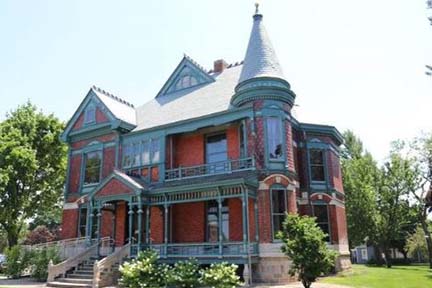
Seven Historic Preservation Projects Honored in Michigan

FOR IMMEDIATE RELEASE
May 8, 2025 Contact: [email protected] Gov. Whitmer Honors Seven Historic Preservation Projects Across Michigan The annual Governor’s Awards recognizes historic preservation achievements in Michigan
LANSING, MICH. – Today, Governor Gretchen Whitmer announced seven Michigan preservation projects were awarded Governor’s Awards for Historic Preservation during a ceremony hosted by the State Historic Preservation Office (SHPO). Communities represented by the projects include Rogers City, Charlevoix, Niles, and Detroit. “It’s an honor to celebrate the 2025 Governor’s Awards for Historic Preservation,” said Governor Whitmer. “These awardees are helping us build a stronger Michigan by preserving the places and stories that define who we are. Their work honors our shared past while creating vibrant spaces where people want to live, work, and invest. Historic preservation is key to our ‘Make it in Michigan’ strategy of supporting jobs, growing local businesses, and fostering pride across our communities.” Now in its 22nd year, the Governor’s Awards for Historic Preservation program, held annually during National Historic Preservation Month, was created by SHPO to celebrate outstanding historic preservation achievements that reflect a commitment to the preservation of Michigan’s unique character and the many archaeological sites and historic places that represent our rich past. This year’s event took place in Heritage Hall at the Michigan State Capitol. “Each May, the State Historic Preservation Office is proud to recognize outstanding efforts to protect and celebrate Michigan’s rich history through the Governor’s Awards for Historic Preservation,” said Ryan Schumaker, State Historic Preservation Officer. “This year’s seven awardees reflect a deep commitment to preserving places that matter, not just for their architectural significance, but for the stories they tell about the people and communities that shaped our state. These projects help ensure that Michigan’s history remains a source of pride, identity, and opportunity for generations to come.”
The 2025 Governor’s Awards recipients are listed below. For full details and videos of each project, visit here. Long-term stewardship of the Rogers Theater Rogers City, Presque Isle County
Awardees: Presque Isle District Library; Mr. Neon Lighting; Karl W. and Mary Ann Heidemann; Rachel Goodstein; and Richard and Janet Vogelheim
The Rogers Theater opened in 1937, providing a new entertainment venue and a touch of Art Moderne design to this northeast Michigan town. In an effort to broaden the types of entertainment which could be offered, a theatrical stage was added beneath the movie screen in the early 2000s. In 2016, the owners announced their plan to donate the theater to the Presque Isle District Library, where it would become another branch among the district’s five existing libraries, exclusively focused on arts, culture, and community programming. The Rogers Theater is a blueprint which illustrates how thoughtful property owners can partner with existing community assets to grow opportunities which benefit everyone.
Long-term stewardship of Charlevoix Historical Society Resources Charlevoix, Charlevoix County
Awardees: Charlevoix Historical Society; Freshwater Charch: a Design Build Firm; Smay Trombley Architecture; Richard Neumann Architect; Steven C. Seebohm Historic Paint Consultation; and the City of Charlevoix
The Charlevoix Historical Society was established in 1972 to enrich Charlevoix culture through preservation and education. Over the decades, the historical society has become the guardian of the 1892-built Harsha House, the 1892-built Chicago & West Michigan Railroad depot, and the 1948 Charlevoix South Pier Lighthouse. The Harsha House is now the society’s History Museum, the depot is restored as an event venue, and the lighthouse remains the city’s most photographed landmark. Partnering with the City of Charlevoix and preservation specialists, the history and historic resources of this lakefront town will be in good hands for years to come.
“We in Northern Michigan have watched our region grow and change over the decades, so it is particularly important that we remember our heritage,” said state Senator John Damoose. “Nowhere is this truer than in Charlevoix. Anyone who knows the history of Charlevoix knows the unique interplay between industry and tourism that has defined the area from the beginning. I congratulate the recipients of today’s award for the rehabilitation and long-term stewardship of the Harsha House, Chicago and West Railroad Depot, and the South Pier Lighthouse. Your work will ensure the lessons of our own history are alive for generations to come.”
Rehabilitation of the Chapin Mansion Niles, Berrien County
Awardees: City of Niles; Niles History Center; and Mihm Enterprises, Inc.
Henry and Ruby Chapin built a highly decorative mansion in downtown Niles in 1884. The family later gifted the mansion to the city in 1932 to be used for civic purposes, and it became Niles’ City Hall. When city offices moved out in 2012, it was time for the mansion’s next chapter as part of the Niles History Center, the city’s municipally operated museum. Since 2012, more than $1.5 million has been invested into the repair and rehabilitation of the historic features of the mansion property from a combination of state, local, and private sources. The Chapin Mansion today hosts annual events, programming, and school and adult tours showcasing regional history. Niles has demonstrated a commitment to the mansion and gone above and beyond in its care, making it a true gem in southwest Michigan.
The collaborative Fort St. Joseph Archaeological Project Niles, Berrien County
Awardees: Western Michigan University; the City of Niles; Niles History Center; and Support the Fort, Inc.
Fort Saint Joseph was established by the French in 1691 on the banks of the St. Joseph River. For nearly 100 years, it was a hub of colonial activity that brought together settlers, soldiers, fur trappers, and nearby Potawatomi and Miami settlements. After the United States claimed the territory in 1781, the fort was abandoned and eventually lost to time. Starting in 1998, a partnership between Western Michigan University and the local community has rediscovered the fort’s location, and helped inform the community about its past. This long-term collaboration today teaches aspiring archaeologists the field techniques needed for their future careers and shares what is found here through community events and a dynamic social media presence.
Rehabilitation of the Harry and Lucy Gordon House Detroit, Wayne County
Awardees: John and Victoria Lange; Terry Swafford, Inc.; McCarver Mechanical Heating and Cooling; and Koala Insulation of East Metro Detroit
Harry and Lucy Gordon were the first occupants of this 1926 Tudor Revival home in Detroit’s fashionable Sherwood Forest neighborhood. The Gordons’ house design featured decorative half timbering, dormers with diamond shingle cladding, and roofing tiles made from concrete. After nearly 100 years in service, the original roof of the home required repairs to address water damage and runoff. Owners John and Victoria Lange addressed this and other rehabilitation concerns by utilizing the new State Historic Preservation Tax Credit. Substantial effort was put into sourcing appropriate historic materials for the project, including a journey out of state to find matching historic roofing tiles. Historic materials and details contribute to the authenticity of a place. Homeowners such as the Langs exemplify the efforts of property owners across the state who live in historic districts, believe in their community, and are willing to go the extra mile, or in this case miles, to preserve the distinctive character of their home.
“The restoration of the Gordon House shows how thoughtful preservation strengthens the identity and legacy of our communities,” said state Senator Mallory McMorrow. “Nearly a century after it was built, this Tudor Revival home continues to tell Detroit’s story, thanks in large part to the dedication of homeowners like John and Victoria Lange. By utilizing Michigan’s Historic Preservation Tax Credit and going to great lengths to source authentic materials, they have not only preserved a remarkable piece of architecture, but demonstrated the profound role historic preservation plays in revitalizing our neighborhoods.”
Rehabilitation of the Book Tower Detroit, Wayne County
Awardees: Bedrock; ODA; Kraemer Design Group; and Brinker-Christman Joint Venture
During the height of the Roaring ‘20s, the Book Tower rose to briefly become the tallest building on Detroit’s skyline. For decades, it was a prestigious address for commercial enterprise. When the final tenant moved out in 2009, it became one of the tallest abandoned skyscrapers on the continent. Bedrock acquired the Book in 2015 and assembled a team of partners to rehabilitate the structure. Decorative exterior statues, masonry, and over 2,400 windows were cleaned, repaired or replaced. On the interior, the most challenging rehabilitation work involved reconstructing an ornate original glass and steel atrium dome. After eight years of work, the Book reopened to new residents and guests. The mixed-use redevelopment converted the 36-story tower and adjacent Book Building into a combination of apartments and hotel rooms, and includes office, retail, and event space. The project has brought new residents and round-the-clock activity to a once desolate corner. This signature building on the Detroit skyline is vibrant once again.
“The creativity and effort to restore the Book Tower and Michigan Central Station in Detroit was nothing short of extraordinary,” said state Representative Joe Tate. “These two gems should serve as testament of where Michigan can go when we all work together.”
Rehabilitation of the Michigan Central Station Detroit, Wayne County
Awardees: Ford Motor Company – Michigan Central; Quinn Evans; and Christman-Brinker Corktown Transformation Joint Venture
For much of the 20th century, millions of passengers from faraway places were welcomed to Michigan beneath the columns and archways of Michigan Central Station. But as modes of travel changed, the station languished. When the last train left in 1988, the building quickly spiraled into disrepair, left open to the elements and damaged by scrappers and vandals. The visionary leadership of Ford Motor Company saved the landmark and gave it new life. Ford acquired the property in 2018 to become the mixed-use centerpiece of a larger, 30-acre innovation and mobility hub. After six years of effort in a project that followed preservation best practices from start to finish, the station reopened in 2024. At the conclusion of the project, the Grand Hall, Ticket Lobby, Concourse, and other public spaces were thought to look as good as the day the building first opened, if not better. It has become a catalyst for new development and source of newfound civic pride. Learn More
National Historic Preservation Month was established in 1973 by the National Trust for Historic Preservation to help local preservation groups, historical societies, and communities promote historic places and heritage tourism and to demonstrate the social and economic benefits of historic preservation. This year’s award recipients spearheaded projects that saved special places, increased economic activity and have continued to educate residents and visitors about Michigan’s history. To learn more about the Governor’s Awards for Historic Preservation program and explore prior year awards by region or by year on an interactive map, visit here. Focused on the historic preservation of culturally or archaeologically significant sites throughout the state, Michigan’s State Historic Preservation Office’s main function is to provide technical assistance to local communities and property owners in their efforts to identify, evaluate, designate, interpret and protect Michigan’s historic above- and below-ground resources. SHPO also administers an incentives program that includes state and federal tax credits, and pass-through grants available to certified local governments. For more information about historic preservation programs and services, visit www.michigan.gov/shpo. |
















